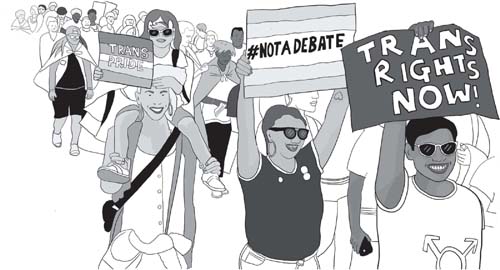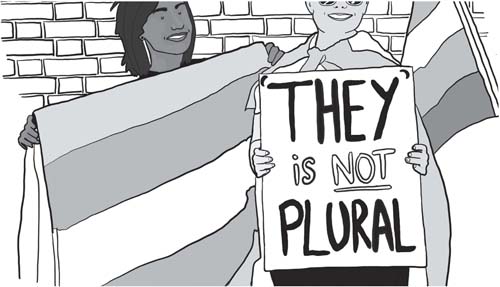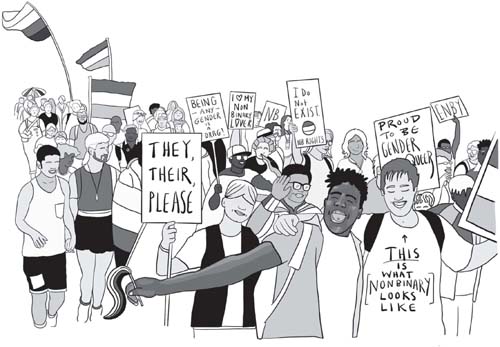
CHAPTER 15
DON’T GET MAD – GET EVEN!
Despite all the amazing things that come with being trans, it can also be extremely challenging – not only for you, but for your friends, family and others around you as well. Trans people are often harassed for who they are and their issues get trivialised by popular media. It can be extremely frustrating to see your issues constantly being misrepresented and people directing misconceptions and stigma towards people like you or the people you love.
Our core instinct is often to get involved, engage with people who are being hateful and try to explain to them why they are wrong. With the rise of social media, it seems that just about anyone can have an ‘opinion’ and people certainly aren’t afraid to voice their views, despite how hateful and ignorant they might be. Challenging those opinions and statements can seem like a constant battle, and some people’s minds will never ever be changed over social media. Social media often creates a big ‘them versus us’ situation, where both parties write comment after comment without actually listening to each other, instead talking over each other. This often doesn’t actually lead anywhere, and it certainly isn’t for the benefit of the person they are trying to prove wrong. If anything, it’s for other people out there that might be reading the conversation and can see the sense that they are making. Every now and then it might actually be possible to convince someone, but it’s often obvious whether people are simply being ignorant or whether they are being deliberately hateful and harmful. For your own sake, we suggest that you really do pick your battles. On social media, a good policy is to screen-grab any nasty statements, report them (to the platform in question and even to the police) and then block them. Many trans activists have started refusing to be in interviews where they would be pitted against transphobic or hateful opponents. This is because our lives and experiences aren’t up for debate. We shouldn’t have to be pitted against people who don’t believe we should exist or would rather we didn’t have a voice.
Taking on every single battle there is can be exhausting and it’s ultimately going to take a toll on your mental health. It is so much more constructive and better for you to focus your efforts elsewhere – in places where you can really make a difference and actually expend your energy on things that lead to positive change. As infuriating as it may seem to just let those comments on Twitter slide, it’s going to make your day better to just use the block button. Don’t read the comments. Ignore the trolls. Don’t say yes to an interview if there is a transphobe also invited. It isn’t worth it. Practise self-care and just say no.
GETTING INVOLVED WITH ORGANISATIONS OR GROUPS
One way to make a difference is to get involved (or even make your own!) in an organisation or group that works towards positive change. In the UK, for example, there are a lot of different – and even local – organisations that you can get involved with. These can range from activity groups, to support groups, to major organisations that are making an impact on a national and even an international level. It’s important to remember that even the smallest of groups – perhaps a group of people in a small town or area – can make a massive difference for the people involved. Such groups are usually starting points for many people and can often give them the safer space that they cannot get anywhere else. This is incredibly valuable and should not be underestimated. Those groups save lives, they really do!
Finding those groups can often be one of the first steps in finding like-minded people and people who can support you. Try looking around on Google or sending some emails to bigger organisations to see if they have any ideas or know about any local groups.

Fox Fisher
MAKE YOUR OWN GROUP
Can’t find quite what you’re looking for? Make your own! If you don’t find an organisation or a group that represents what you need or want to do, you can always create one. There are many ways to do this, but the first step is definitely seeing if there is interest out there. This can be done by starting a Facebook group for a certain area, adding a few people, letting them add some of their friends and letting it snowball from there. You could also put up posters in your school (with permission from your school, of course) and ask people to get in touch if they are interested, and so on.

Fox Fisher
It’s important to have a clear idea in mind before you seek out people. People like to know what they are getting into, whether it is a support group, or a group that hosts events, or a group that organises activism, and so on. So set your focus and then search for people. If you do get people interested, it’s important to fix a time to meet and host regular meetings (once a week or once a month or something like that) and keep active. Obviously it can be draining to try to organise a whole group and keep it afloat, but getting other people involved and interested will be easy if you really work at making the group active and vibrant. Just be careful not to burn out, and make sure you set boundaries and get people to help you, so that everyone’s happy, inspired and ready to go.
WRITING A BLOG
Writing is such a powerful way to collect your thoughts and share your ideas with the world. Having a website where you make blogs and write about all the things that frustrate you can be massively therapeutic. It can also help people around you to understand certain things, without you having to confront them directly or have the same conversation over and over again.
Blogging about your life can be very useful for other trans people, and people might enjoy hearing about your life or connect to the things you write about. It’s definitely worth doing for yourself, and it’s even better if other people can get inspired or like reading what you write.
This can also lead to you writing articles for various platforms, so it’s important to build up your writing skills and get thoughts and comments from people around you. All writers start somewhere, and a blog is certainly the modern way to start a writing career.
ACTIVISM AND CAMPAIGNING
Getting involved with activism or campaigning is always something you must think about carefully, especially if it involves public campaigning or becoming a public person. There are already a lot of public people out there who do different things and are known for their work. They’ve all worked really hard to get to where they are, so don’t expect things to simply happen overnight. Activism and campaigning are really hard work, and people often burn out or feel completely spent. Preparing for a public interview can be extremely stressful, especially if you don’t take proper care of yourelf. The media can often be very ruthless, and it’s important that you don’t leap at every single opportunity, interview or request that comes in, as doing so will completely wear you out. Therefore, make sure you have the time and energy to do the things you say you’ll do.
It’s okay to say no, and it’s actually very important that you learn how to do this. It’s important for your own wellbeing and it’s important to learn to put boundaries in place and not take on everything just for the sake of doing it. There are so many amazing people out there that can do it, and sometimes someone else might be a much better fit for what you’re being asked to do. For example, if the topic is about trans people of colour and their issues and you’re not a trans person of colour yourself, it’s actually very important that you give a trans person of colour the opportunity to take this on as they are much more fit and equipped to address those particular issues. So don’t be afraid to delegate, and don’t be afraid to say no. People will respect you more for it, and you won’t burn out.
Once you become a public person, you can become a target for hateful people or groups. It makes you vulnerable to people who might disagree with your advocacy. If you are in the public eye, it’s important to be ready for whatever might come along. People in the public eye usually get criticised a lot more than other people, simply because they are on show. It’s important to set yourself boundaries and avoid reading hateful comments or getting involved in arguments on social media afterwards. Even simple interviews or quotes in articles can spark a lot of controversy, so be sure that you know how you’re going to handle things and make sure you take time to do some self-care and surround yourself with positive and supportive people.

However, activism and campaigning aren’t just about speaking out in the media or having protest marches. They are also about reaching out to the people around you and using your art, your music or any of your hobbies or talents to create change and raise awareness. For example, you could organise a play on trans issues or try to implement gender neutral bathrooms at your workplace. Activism can be simple acts of speaking to your friends, your family or the people around you. All of these things create waves of change and there is no act that should be considered more important or better than another. There are so many different ways of doing activism and campaigning, so be creative!